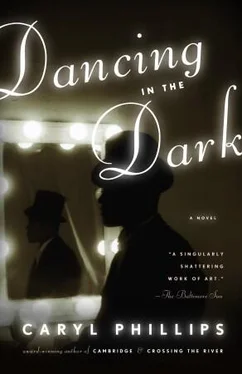BELIEVE ME
From Mr. Lode of Koal
But believe me, I’m getting tired of always being de dab
Days worked on me so faithfully
’Til I’se wore most to a rub
You all have heard about dat straw
That broke de camel’s back
Well a bubble added to my load
Would shelly make mine crack
But believe me.
A question being asked by many is whether George Walker… is greatly missed.… When Bert Williams made his initial appearance in the first act, the writer at once thought of Walker, as he had been seeing the two make their first appearance together for years. But the writers [of the new show] have so constructed the piece that as the moments fly, Bert Williams… proves that he is capable of starring alone successfully.
NEW YORK AGE
As he leaves I want to ask Bert to please stay away and not cause my husband so much distress. Not cause us all so much distress, looking at us with his charity eyes. But I say nothing. It is sometimes difficult to decide which of the two of them is in greater pain.
That last night on stage I was lost, but I hope that people will forgive me. At times I made some sense, but at other moments I watched the rest of the cast watching me and I knew that they were baffled. But now I am gone. Out of sight. On my way back to Lawrence, Kansas, a place I hardly remember for I left there as a young boy and suffered endless humiliations on my way to the west coast. In California I nearly starved to death in the streets, singing and dancing and begging people for money, and then I stole a banjo. The face of the man I took it from is a sleeping face. Did I really steal a banjo from a sleeping man? But I could play the instrument, and owning a banjo made it easier to loiter on the street corners and try to earn pennies from passersby who felt sorry for me. Easier than it was to beg the managers of the various theaters for work. All the way from Kansas and I had been reduced to a banjo-stealing, banjo-playing beggar. I know full well that what I did was wrong. I should ask Aida to find this man, and we should buy him a silver banjo to express our gratitude. Does he know that it was George Walker who survived because of his banjo? I will talk to Aida of the banjo.
Aida, why do you sit looking at me so? When I talk to you of the banjo that I found on the streets of San Francisco do you understand what it is that I am talking about? I can see that you are trying to follow my words, but it is difficult for you, isn’t it? What do you want from me? A confession that I truly did taste every woman that crossed my path? That I suffer from a touch of Jack Johnson fever? I am no saint, Aida. I lived my life recklessly and I know that being reduced to this state is part of the price that I am paying. Forgive me my weaknesses, and forgive me if I hurt you. That is all I can ask of you, dear wife. Sit here with me in the darkness as I journey back to my hometown of Lawrence, Kansas, by way of the streets of San Francisco. I am not ashamed of where I am from. Sit here with me while I return to my childhood in Kansas territory.
Sometimes I wake up in the morning and the bedclothes are somewhat tousled and things are not as they should be, but always my wife is lying next to me, keeping me warm. Dawn is painful. Lying in bed and staring at the ceiling, watching light bleed slowly across it, watching the day reach out and paint this small room a brighter hue. From ceiling to floor a new day has arrived, but without help I cannot rise to meet it. I never hear about her anymore, and there is nobody I might ask. Does she remember? I imagine that she is still scandalizing the New York theater world and a weak smile creases my lips, but the smile does not have the strength to travel across my face, and the greater portion of the smile remains lodged in my heart.
Mr. Comstock decides to close the show, but it is the theater manager who informs me. Mr. Comstock has not the courage or the decency to approach me directly with this sad news, and I therefore have to give this regrettable information to my company. They are devastated, but I have little choice but to agree with Comstock and attempt to recoup some of my losses. The newspapers are terse with their reporting. “ Mr. Lode of Koal closes early in New York, and early on the road.” I am left with a mass of obligations, and no money, and a mountain of debts that will take me at least one successful season to pay off. Reluctantly, I make my arrangements to return to vaudeville.
My husband cannot properly manage his company business without the help of George Walker. In the past he entrusted much of Williams and Walker’s affairs to his partner, and now, without George, he is in disrepair, a plight that distresses him for it suggests a lack of decorum. But what can he do? He must at least try to be responsible, but it is written on his face that this situation is an intolerable burden and he is drinking and smoking and coughing more than ever.
Mr. Williams told me that for over a week he carried about a contract to play [over] the Moss Stoll circuit abroad at a salary of $1,ooo a week; the contract called for four consecutive weeks, with an option to increase the time to twenty weeks, if agreeable to all concerned. All Mr. Williams had to do was attach his signature to the contract and take passage for London, where he would open in one of the big variety halls.
The contract arrived a week ago, but I have no desire to return to England. Not without George. In fact, without George I have no desire.
The beer and whiskey stand before him, large and small, sweet and sour, and he sips one and then the other, and then leans back and closes his eyes for he is suffering bad weather in his mind. Mr. Florenz Ziegfeld has made him a generous offer that will solve many things, but Bert knows that it will also mean trouble. A lawsuit from Comstock, who still imagines him to be under contract, and then the hostile attitude of the white players in the Follies company. He will, of course, also have to contend with the disappointment of his own people, who will not take kindly to his abandoning the world of colored theater. He opens his eyes and notices a layer of dust on the old bottles that stand behind the bar. He is fully aware of the low regard in which a minority of colored people hold him. Since Jack Johnson became the heavyweight champion of the world, race pride has been rising everywhere, and these days some Negroes look askance at him. It is difficult being Bert Williams today, and because he has an offer from Florenz Ziegfeld there are those who will think that everything must be fine and dandy for him. They will assume that he cannot possibly have a care in the world, but colored show business is at a low ebb, and he knows that at the moment it is better to join a large white show than to star in a colored troupe, particularly so as he is now attempting to work without the business brain of George Walker. Mr. Ziegfeld offered him a leathery hand to shake and seal the deal and ensure that he joins a cast of 125 as the only Negro, supported by an orchestra of forty-two, with sixty Follies girls, and the opportunity to play small parts in a variety of sketches to an extremely well heeled audience. For his initial season in the Follies of 1910, Mr. Ziegfeld will bill him as “The Blackbird with Songs.” He drinks his beer. His critics, white and colored, should try making capital humor out of one day in his shoes. He takes a cautious sip of his whiskey, then tips it up and drains the glass. They should try spending one day in his shoes, but he is not complaining. He knows that he does not have the right to complain.
At the darkest point of the night a shadow of fear passes momentarily across his face and he begins to pray furiously to a God that he does not believe in for he can see the door now, and for the first time he notices that it is slightly ajar and voices from the other side are calling and asking him to come home, begging him to rub sleep from his eyes and walk in only the shorts that he is wearing, and on the soles of his feet that are thick and hard, like baked clay, from years of dancing, pleading with him to move now beyond the rush of memories that have been cruelly sharpened by time so that images tumble one on top of the other, seeing the beautiful curve of Eva’s spine as she sleeps, his lover as hot as a two-dollar pistol, a woman who greets the day like an octopus declaring that she needs her a “do-right” man but still she refuses to be tongue-kissed by George or any other man, and Bert asking him, “You still sweet on her?” as though he has any control over the matter. “George, you still sweet on her?” And on the other side of the door is death’s thicket of trees that he will soon plunge into, and the medley of voices soft like summer rain urging him to come home, come home to Kansas, and George praying furiously to a God that he doesn’t believe in to give him guidance even as he high-steps his unsteady way toward the door and stutters in a rough and lisping voice, “Farewell,” and again, “Farewell,” knowing that soon he will be accompanied on this first part of his journey.
Читать дальше












